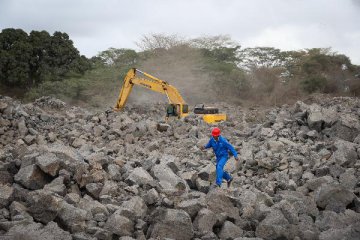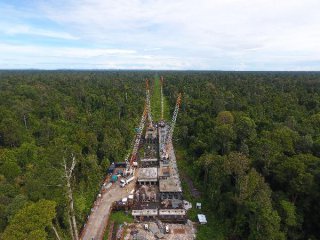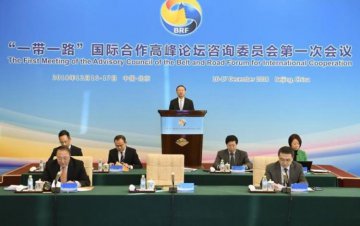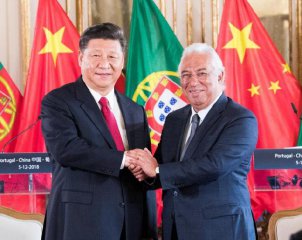
Portugal has been the first Western European country to join the circle of friends for the Belt and Road Initiative, setting a good example for other European countries.
As the 40th anniversary of China-Portugal diplomatic relations approaches, China and Portugal signed a memorandum of understanding (MoU) on December 5, pledging to jointly push forward the construction of the Belt and Road to strengthen Asia-Europe connectivity and boost global trade.
During the talks between the two sides, Portugal expressed its willingness to participate in the B&R Initiative, by trying to become the hub of the Silk Road Economic Belt and the 21st-century Maritime Silk Road.
Chinese State Councilor and Foreign Minister Wang Yi said that the signing of the MoU on jointly building the B&R Initiative, will exert positive demonstration effect on Europe. He believed that the links between B&R Initiative and the development strategy of EU can be strengthened through the joint work of China and Europe, especially as the comprehensive strategic partnership between the two sides comes into the 15th year in 2018.
Wang Yiwei, director of the Center for European Studies at Renmin University of China, pointed out that Portugal is the western-most European country, and one of the primary players in the European Age of Discovery and Exploration. Support from such a country for the B&R Initiative has a strong symbolic significance, fully demonstrating that instead of a zero-sum game, the initiative can create a mutually beneficial and win-win future for all parties.
Zhang Jianping, researcher at the Chinese Academy of International Trade and Economic Cooperation (CAITEC), said that although some Western European countries have doubts about the B&R Initiative, Portugal’s choice, based on historical exchanges, current friendship and judgments on future development, will certainly influence these countries.
Naturally close to the Belt and Road construction
Portugal enjoys an excellent geographical location, which is vividly portrayed in the famous phrase "where the land ends, the sea begins", written by Luís de Camões, the greatest poet of Portuguese language.
Guarding the southwestern part of the Iberian Peninsula, with the Atlantic Ocean along its west and south part, Portugal has an important hub connecting the Silk Road Economic Belt and the 21st-century Maritime Silk Road, which gives the Sino-Portuguese cooperation under the B&R Initiative a natural advantage.
In fact, Portugal has always been interested in joining the circle of friends for the B&R Initiative. As early as April 2015, Jorge Torres-Pereira, Portuguese Ambassador to China at that time, noticed that Portugal seems to be absent in the original conception of this initiative, and hoped that the Maritime Silk Road can enter the Mediterranean Sea through Africa, via the Red Sea, and then extend all the way west to the Atlantic Ocean.
Portugal's Prime Minister Antonio Costa commented the MoU with China as a strategic affirmation of Portugal's role in connecting Asia and Europe. He added that China is very welcomed to invest, produce and manufacture in Portugal, and expand cooperation with Africa and other places, using the platform offered by the Forum for Economic and Trade Co-operation between China and Portuguese-speaking Countries (Macao), also known as Forum Macao.
"Portugal is the most developed economy among the Portuguese-speaking countries and an important springboard and node for China to enter the Western European and Latin American markets," said Zhang Jianping, who also pointed out that the signing of the MoU between China and Portugal will not only help deepen the economic and trade relations of the two sides, but also have a positive impact on China-EU and China-Latin America cooperation.
In May 2017, Jorge Costa Oliveira, Portugal's Secretary of State at that time, led a delegation to China to participate in the Belt and Road Forum for International Cooperation (BRFIC). During that trip, he expressed the hope to let Portugal's Port of Sines included in the 21st Century Maritime Silk Road, and let the country included in the China-Europe freight train line, given that the train could already reach Spain’s Madrid, a city only 500 kilometers from the Port of Sines. If the railway line can be extended, the ends of the Silk Road Economic Belt and the 21st-century Maritime Silk Road shall meet.
Currently, Portugal is vigorously promoting the expansion of the Port of Sines, enabling it to realize land and sea connectivity and become a logistics hub for transatlantic trade, introduced Wang Yiwei.
The Port of Sines is a deep-water port on the Atlantic Ocean, equipped with an industrial and logistics park. This year in March, the Portuguese government began tendering for the renovation of the port, including the construction and upgrading of the railway from Sines/Lisbon to the Spanish high-speed rail. Before the beginning of next year, the Portuguese government will also start bidding for the port’s new terminal project, with a cost of about 650 million U.S. dollars, according to Wang.
China's fifth largest investment destination in Europe
In recent years, China-Portugal economic and trade cooperation has been continuously expanded and deepened, and China has become Portugal's largest trading partner in Asia.
According to statistics by China's General Administration of Customs, the bilateral trade volume between China and Portugal in the first 10 months of 2018 reached 5 billion U.S. dollars, an increase of 8 percent year on year. Of this total, China's exports to Portugal were 3.1 billion U.S. dollars, up 5.5 percent, and imports from Portugal were 1.91 billion U.S. dollars, up 12.5 percent.
Moreover, the investment cooperation between the two sides has been even closer. After the outbreak of European debt crisis in 2011, the international market lost confidence in Portugal’s economy, as it is one of the most badly affected by the crisis. However, Chinese investors saw opportunities through the context, and took active part in the privatization of Portuguese companies.
Today, Portugal is already China's fifth largest investment destination in Europe. According to official data, as of the end of October 2018, Chinese companies have invested more than 9 billion U.S. dollars in Portugal, covering energy, water, communication, finance, insurance, healthcare and other fields. In turn, Portugal have invested in 255 Chinese projects during the time period, with actual use of funds totaling 210 million U.S. dollars.
In May 2012, China Three Gorges Corporation (CTG) acquired a 21.35 percent stake in Energias de Portugal (EDP) for 2.7 billion euros, becoming its largest shareholder. Alex Zhang, head of the U.S. law firm White & Case LLP in China, and Axel Schulz, attorney of the company’s European office, both agreed that the deal was the starting point for Chinese capital to enter Portugal.
They also believed that thanks to this acquisition, direct investment from China will more and more flock to Portuguese industries such as energy, transportation, infrastructure, telecommunications, consumer goods, financial services, real estate and media.
Portugal is the first European Union member to open completely to foreign capital, therefore, this country, though not big, has become one of the main destinations of China's direct investment in Europe, pointed out the two experts. In fact, added them, in terms of Chinese investment destinations from 2000 to 2016, only the United Kingdom, Germany, Italy, France and Finland can be ranked before Portugal.





















Latest comments